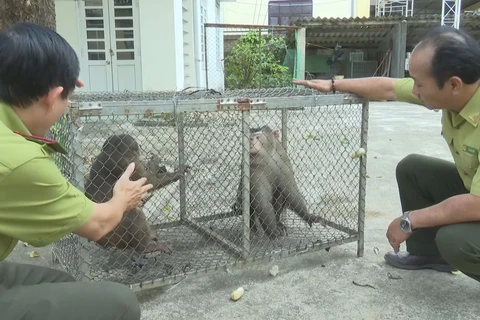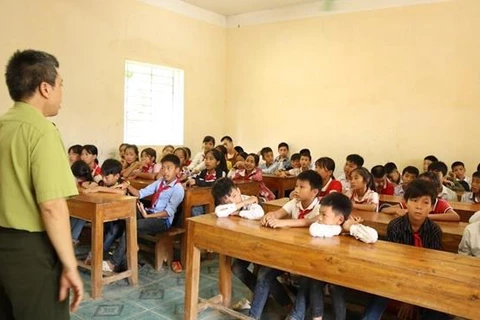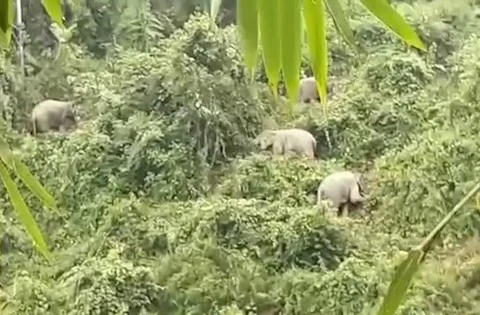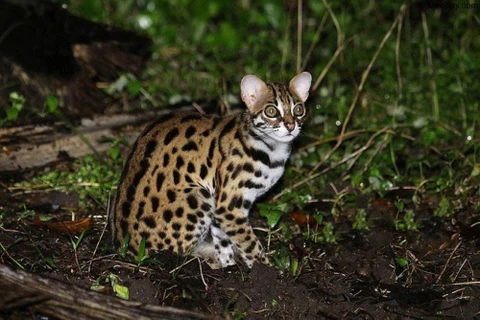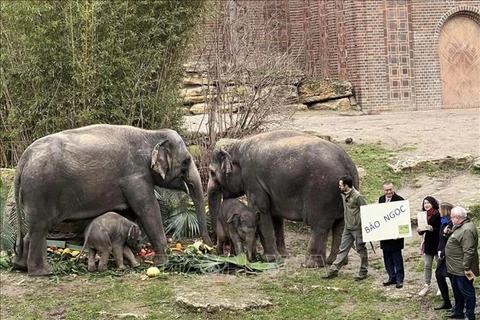 A pangolin caught in the jungle. The high demand for wildlife meat in urban areas will increase hunting cases in the jungle. (Photo courtesy of WWF-Vietnam)
A pangolin caught in the jungle. The high demand for wildlife meat in urban areas will increase hunting cases in the jungle. (Photo courtesy of WWF-Vietnam) Dubbed "Say No to Wildlife Meat Consumption," the plan aims to achieve a "zero wildlife consumption" goal by 2030.
The city People's Committee has unveiled a series of action programmes to eliminate all wildlife-related activities, from trade and transportation to storage and cooking in restaurants and shops.
The seven-year plan is a far-reaching effort that will demand the cooperation of state agencies, hotels, restaurants, bars, pet shops, herbal medicine shops, and communities to halt the use of wildlife products, even in private homes.
Vice Chairman of the city People's Committee Nguyen Minh Nam said the reduction in demand for wild meat in urban areas would help decrease the number of illegal hunting in jungles and natural reserves.
Nam said Tam Ky would reach the plan's target with the involvement of all parts of communities, both in urban and near forest areas.
He also called all families, people and friends to join hands in ending wildlife meat and product use in communities.
Deputy head of the Quang Nam provincial forest protection sub-department Tu Van Khanh said the ranger force would strongly support the plan and provide technical assistance to the city's authorities in tackling wildlife meat and product.
In a survey in Tam Ky city alone by the World Wide Fund for Nature (WWF) in 2020, 93.5 per cent of asked people agreed that wildlife meat was the most used among related products.
According to another survey in 2021, many consumers of Tam Ky believed using fresh wildlife meat helps demonstrate them as luxury gastronomers or rich people while supporting them stronger with nutrition.
Hue city, the central province of Thua Thien-Hue, also promised to become the first urban in Vietnam 'Say No to Wildlife Meat'.
Last year, a campaign was launched by USAID and WWF to reduce the demand for wild animal meat.
The USAID's Biodiversity Conservation project aimed to raise public awareness of the risks of consuming it with a message: 'Once wild meat is on the dining table, the risks are exposed'.
A series of planned events highlighted risks to public health, the legal penalties, and the risks to nature associated with the illegal consumption of wild meat.
"Despite being one the world's most biodiverse countries, Vietnam has experienced staggering wildlife losses. USAID partners with Vietnam to conserve and restore its wildlife. Participation from local communities is vital to conservation success. We invite communities to join us in raising awareness of the risks of eating wild animal meat to help reduce demand for wildlife trade," said USAID/Vietnam Acting Deputy Mission Director Annie Wallace.
The USAID project changes individual behaviours and social norms that reduce local demand for wildlife meat, including pangolin, civet, and other wildlife species. This is one of four strategies the Project implements to achieve long-term biodiversity conservation goals in Vietnam.
Vietnam is one of many Asian countries where wild meat and other animal parts have been consumed for food and medicinal purposes for generations. This ongoing demand is unsustainable and has already led to dramatic declines in wildlife populations, resulting in pressure on wildlife in neighbouring countries to meet the demand.
A survey conducted by WWF-Vietnam in 2021 showed that 90% of wild animals hunted illegally ended up mainly in urban restaurants, with only 10% consumed locally.
"Vietnam's wildlife populations are in a crisis, driven by the ongoing demand for wildlife meat and other products and hunters' continued indiscriminate use of snares," said Nick Cox, Chief of Party, USAID Biodiversity Conservation, WWF-US. "Reducing demand for wild meat needs a dramatic change in behaviour and social norms so that the consumption of wildlife is seen as socially unacceptable. We need every citizen to stop wild meat consumption from helping prevent the human health risks and ensure wildlife populations have a chance of survival."
The USAID Biodiversity Conservation is funded by USAID and implemented by WWF, in partnership with the Management Board for Forestry Projects, Ministry of Agriculture and Rural Development (MARD), and aims to secure the remaining strongholds of intact natural forest and wildlife populations in Vietnam.
USAID Biodiversity Conservation works in Quang Nam, Quang Tri, Thua Thien-Hue, Quang Binh, Lam Dong, Cuc Phuong National Park (Ninh Binh province), Vu Quang National Park (Ha Tinh province), and Cat Tien National Park (Lam Dong and Dong Nai provinces)./.
VNA
